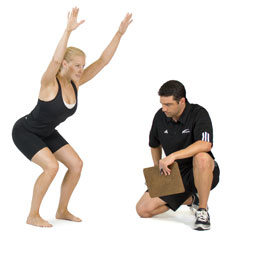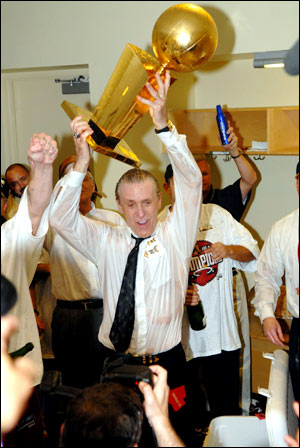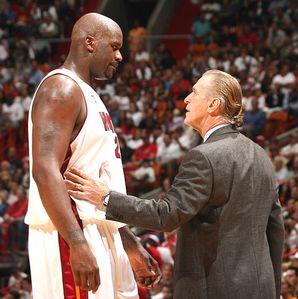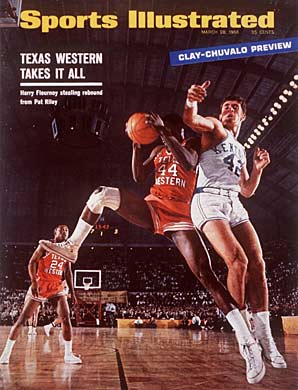
I’ve asked a number of friends why they don’t include assessments as part of their screening process. More often than not the answer is because they are “too busy.”
What takes more time? An initial assessment of your athletes on intake followed by some simple corrective strategies or a 6-month post-surgical ACL rehab?
If you are too busy to change today, how will you have time to fix it later?
Art Horne is the Coordinator of Care and Strength & Conditioning Coach for the Men’s Basketball Team at Northeastern University, Boston MA. He can be reached at a.horne@neu.edu.
Topics:
Art Horne,
Strength Training,
basketball training programs,
athletic training conference,
boston hockey summit,
boston hockey conference,
hockey conference,
Shirley Sahrmann,
Good to Great,
female basketball,
evidence based medicine,
development

I heard a story recently about a basketball coach that will “get lost” on his way back to campus from the airport after picking up a recruit in an effort to intentionally place the recruit in an uncomfortable situation.
Two things happen.
1. The recruit will sit quietly, put their head down and perhaps jump on their cell phone, text message friends, headphones in and wait for the coach to find his/her way back to campus.
or
2. The recruit will ask questions about general directions, look for street signs that may aid in their quest back to campus and even some will use their technology packed phone to locate their whereabouts on GPS and plug in the schools address providing the coach a clear and decisive path back to campus.
With all things being equal, which kid would you rather have on your team?
Are you worth being recruited to a better team or are you quietly sitting at your desk, minding your own business waiting for others to figure things out?
Art Horne is the Coordinator of Care and Strength & Conditioning Coach for the Men’s Basketball Team at Northeastern University, Boston MA. He can be reached at a.horne@neu.edu.
Topics:
Art Horne,
basketball conference,
athletic training conference,
hockey conference,
motivation,
Good to Great,
everything basketball,
development
Seth Godin does it again...

Do You Need A Permit?
Where, precisely, do you go in order to get permission to make a dent in the universe?
The accepted state is to be a cog. The preferred career is to follow the well-worn path, to read the instructions, to do what we're told. It's safer that way. Less responsibility. More people to blame.
When someone comes along and says, "not me, I'm going down a different path," we flinch. We're not organized to encourage and celebrate the unproven striver. It's safer to tear them down (with their best interests at heart, of course). Better, we think, to let them down easy, to encourage them to take a safer path, to be realistic, to hear it from us rather than the marketplace.
Perhaps, years ago, this was good advice. Today, it's clearly not. In fact, it's disrespectful, ill-advised and short sighted. How dare we cheer when a bold changemaker stumbles? Our obligation today isn't to spare the feelings of our peers from future disappointment. It's to establish an expectation that of course they're going to do something that matters.
If you think there's a chance you can make a dent, GO.
Now.
Hurry.
You have my permission. Not that you needed it.
Topics:
basketball performance,
basketball resources,
boston hockey summit,
boston hockey conference,
discipline,
customer service,
everything basketball,
development,
Seth Godin
How do you avoid complacency in a team setting?

RILEY: First of all, you have to realize that complacency is a way of life. You don’t ever avoid it. You have to alert your players to the fact that there are so many things that can get between them and what you are trying to teach them.
You can’t become distracted and let all of these things get into the way and take your mind off of the prize. It’s a deadly disease because it simply gets in the way of your energy and your effort. And when your energy and your effort are down, your efficiency is going to be down.
(Interview questions and answers taken directly from the February 2007 edition of Scholastic Coach & Athletic Director)
Topics:
basketball performance,
basketball resources,
basketball training programs,
athletic training,
Ownership,
Pat Riley,
discipline,
customer service,
development,
Leadership
How important is it to relate to individual players and how can a coach improve his or her interpersonal skills?

RILEY: It depends on what level you are coaching. When it comes to coaching on a youth level, in a junior high school level, or a high school level, where kids are still maturing emotionally, physically, mentally, and spiritually, I think the communication, talking, educating type of approach transcends the actual X’s and O’s. I think you have to develop the mind and the will as much as you develop them on the court.
As players get older, especially as professionals, they will bring the philosophies of five to fifteen coaches with them. That means they have been talked to, they have been coached by a lot of different people, they have been motivated and inspired, and they know what it’s like to be a player who is being coached. Sometimes in professional basketball, saying less is best. Your actions and how they work and what you put in front of them every day will be noticed.
If I were coaching a high school team, I would be teaching, teaching, teaching, and teaching verbally every single day to every single individual.
(Interview questions and answers taken directly from the February 2007 edition of Scholastic Coach & Athletic Director)
Topics:
basketball performance,
basketball resources,
basketball videos,
Pat Riley,
discipline,
development
You have said that dscipline is not a dirty word. Some coaches are wary of disciplinary action fearing it may have an adverse effect. What is your approach? How can a coach use discipline to his or her advantage?

RILEY: Whenever somebody goes outside the covenants and does something that can break the spirit of the team it cannot be allowed. As a coach, I liked to take some of my most experienced players and converse with them about what they think should be done. It isn’t just a my way or the highway thing. Even though at times someone can do something so egregious that yes, he’s out of here. And I think we understand what those things are. When that happens, there is no team consultation.
(Interview questions and answers taken directly from the February 2007 edition of Scholastic Coach & Athletic Director)
Topics:
basketball performance,
basketball training programs,
Pat Riley,
discipline,
everything basketball,
development
Your award-winning motivational video, Teamwork, applies winning philsophies to business and life in general. What is your definition of teamwork as it applies to sports?

RILEY: Teamwork is the essence of life. And teamwork is an interactive relationship, whereby all of us are either hired or brought together for whatever reason to get a result. It is the essence of life in family. It is the essence of life in sports. And it is the essence of life in business. In order to be successful as a group of people the dynamics of being a team are all the same, with the exception that you are jumping off a different platform – probably from a different industry. But really, the principles are the saem. People have to come together for the common good.
The only way you are ever going to do that is through trust. It’s even more than belief. Belief just isn’t enough. You simply have to get to a point where you trust one another – in their motives, in their approaches, in their games, in their idiosyncrasies, and their personalities, and what they bring to the table – not be judgmental as a coach, or a teacher, or a parent. No student, no player, no child will ever let you coach, parent, or teach them unless they trust that you are absolutely sincere, competent, and reliable. They are smart enough to see that. If your intentions as a coach or a teacher or a parent are nothing less than sincere, because you want to get something out of it yourself instead of what’s in the best interest of the person, then they won’t let you. They will sort of punch the clock with you.
You have to be competent because they want to learn. Most kids and most players simply want to learn and get better. And so you have to know what you’re doing. It’s the same thing when it comes to reliability. If they know you’re going to be there, then the trust and the fact that teamwork can cross over from sports into real life will be there, too.
(Interview questions and answers taken directly from the February 2007 edition of Scholastic Coach & Athletic Director)
Topics:
basketball performance,
basketball resources,
Pat Riley,
discipline,
development,
Leadership

It’s been 6 weeks since the date of injury and the athlete you’ve been working with is nowhere near ready to return to play. The coaching staff is breathing down your neck demanding answers and the rest of your staff is raising their eyebrows wondering what could have gone wrong.
Panic sets in….
Instead of panicking after it’s too late, try allowing panic to set in early.
Have a work-study student do a lit-review on the injury as soon as it happens, research the probable causes, latest rehabilitation techniques, running progressions, alternative therapies, and similar cases.
Better yet, let panic set in real early.
Prior to the date of injury, research and implement prevention strategies alongside your performance staff prior at the beginning of the season. Perform a meaningful orthopedic and movement screen with your athletes on the same day as your traditional pre-participation screenings to identify asymmetries and dysfunctional movement patterns with prescribed intervention to address these problems.
Let panic set in before there is anything to panic about.
Panic just like a duck. Calm above the water, and paddling like mad underneath.
Panic is good.
Panic keeps you a float and moving forward.
Art Horne is the Coordinator of Care and Strength & Conditioning Coach for the Men’s Basketball Team at Northeastern University, Boston MA. He can be reached at a.horne@neu.edu.
Topics:
Art Horne,
athletic training conference,
boston hockey summit,
Strength & Conditioning,
Good to Great,
customer service,
development
I have previously mentioned in this blog a team building event that we run for our student staff every year. Though it is a lot of work, it is always a very rewarding experience for everyone involved and in particular the students. Though some of our full-time staff are otherwise occupied and unable to volunteer, we do always have a good number of staff who are willing to give their time for a good cause. One of the keys to the event of course is the formal invitation to student staff that goes out several weeks beforehand so that we can gauge attendance numbers for food, prizes, etc. The collecting of student email addresses from their various supervisors on our full-time staff is always a challenge, but one staff member in particular has proven year after year to be “unable” to provide the email addresses of her students. This year they emailed me five days prior to our event to apologize for not getting back to my inquiry until then and wondered if it would still be possible to include their staff. I promptly returned their email, again requesting just the email addresses for their staff in whatever form was easiest for them. The day before the event their response finally came and it said, “Dear Shaun, I just got time to get to this email. This September has just been too overwhelming. I truly appreciate the offer – maybe next year.” Maybe next year? Now, in all fairness, this person does have upwards of seven students working under them. In the time that it took to send me two emails apologizing for being busy though, don’t you think they could have found the time to send me seven email addresses instead?
What’s our most valuable resource as employees? Yup, you guessed it . . . time. There’s an old saying that goes, “There are only so many hours in the day.” That’s definitely true, but it’s not the time you spend at work or working that matter so much as what you do with those same hours. That’s not to say that quantity is more important than quality (any medical professionals reading this?), but why take the time to send out a two page email to half of your colleagues when a simple phone call to one of them can clear up your issues in a fraction of the time? Why have a meeting with ten people when you really only need three of them to resolve the issues at hand? Are our assistants meant to perform the same tasks as us simultaneously or are they better suited to handle some tasks so that we can focus on others? Think of it this way; if your company hired an independent consultant to come in and evaluate your work habits, would they report back that you were a model of efficiency or someone that would benefit from some additional training?
A former colleague of mine recently posted or perhaps re-posted a tidbit that I found extremely interesting. It said, “If you could only send 10 emails at work tomorrow, I bet those emails would really count for something.” Working on cutting down on email vs. more personal contact (over the phone or in person) is just one area that we can focus on to improve our use of time. This is a point that I harp on again and again, but just because you or your workplace has always done something one way does not mean there is not a more efficient way of doing it. Take some time to evaluate your day to day tasks and ask that imaginary consultant on your shoulder if this is the best (time efficient and of high quality) way to do this.
One of the larger problems however is that some of us look at a clock and see work time as the same whether we are being productive or not. If you fall into that category, then my suggestion is even simpler . . . perhaps it’s time you looked at a new career.
Shaun Bossio is the Assistant Business Manager and ProShop Manager at Boston University FitRec. He can be reached at sbossio@bu.edu
Topics:
Guest Author,
Ownership,
Good to Great,
discipline,
customer service,
development,
Leadership
There’s a big difference between 1) surrounding yourself with random people of a like mind, whether it’s a social club, a network of professionals that share the same passion, or simply the running group you belong to that meets every Saturday morning and 2) actually knowing someone.
Your buddy at the running club may get you a free cup of coffee and muffin, but knowing someone, I mean really getting to know someone, will get you a job.
The community of people that you lightly associate yourself with may become a future asset, but the people that you have been investing time with will become your currency today.
Art Horne is the Coordinator of Care and Strength & Conditioning Coach for the Men’s Basketball Team at Northeastern University, Boston MA. He can be reached at a.horne@neu.edu
Topics:
Art Horne,
Good to Great,
development,
Leadership










